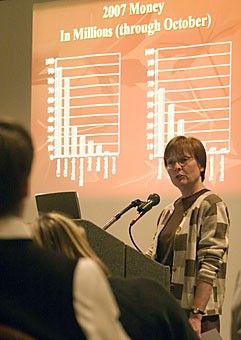A group of about 50 UA students, professors, Tucson residents and ex-politicians met yesterday to discuss topics and issues surrounding presidential primaries.
Some of the talk took shots at the ongoing run to the White House.
“”It’s a little sloppier, more manipulative and abusive,”” Richard Kimball, president of Project Vote Smart, said of the upcoming elections. “”There’s also a lot more money involved.””
He would know. Kimball ran as a Democrat against John McCain, now Arizona’s Republican senator, for a seat in the U.S. Senate in 1986.
“”People are frustrated and less likely to be tolerant of the candidate’s behavior,”” Kimball said.
The discussion was held in the conference center of the Four Points by Sheraton Tucson, 1900 E. Speedway Blvd. The Department of Political Science sponsored it in collaboration with Project Vote Smart, a national nonpartisan political research organization.
Bruce Ash, a member of the Republican National Committee, addressed the effect of the Internet on public opinion. Now, he said, people can look up old clips of candidates on YouTube and find out if they’ve “”flip-flopped”” on a topic.
“”We’re kind of walking on uncharted water,”” he said. “”The Internet was just coming into play in 2004. They have to watch what they say because there’s always going to be someone there with a camera and a microphone.””
One of the main problems with the presidential primaries in Arizona is that residents registered as “”independent”” are not allowed to vote in the primaries.
“”This is the only primary in which you can’t cross over (if you’re Republican or Democrat),”” said William J. Dixon, head of the political science department. “”One of the reasons you can’t be independent is because the parties don’t want you to.””
Many people stated a problem with the fact that presidential parties have more say over what is allowed in elections than state legislatures do.
“”The state
-One of the reasons you can’t be independent is because the parties don’t want you to.
-William J. Dixon,
head, political science department
legislatures make their state laws and parties have rules that they have to follow,”” said Barbara Norrander, a political science professor. “”The Supreme Court will always give the parties precedence over the state legislatures.””
Some people at the discussion found the media to be at fault for not providing equal coverage of candidates. Others argued that it would be impossible to do so.
“”There’s no way the media can cover 15 candidates equally,”” Norrander said.
Some criticized the candidates for using the media to put their opponents in a negative light. Others did not think it was such a bad thing.
“”The more time you can see a candidate under pressure, the more confident about them you can be,”” said Bob Hurgate, a retiree and longtime supporter of Project Vote Smart.
The one notion nearly everyone seemed to agree upon was that a single, national primary election would alleviate all the drama of which state gets to go first.
Norrander and Dixon thought that it would not be as wonderful as it sounds.
“”Only famous or rich candidates would be able to run,”” Norrander said.
Arizona Gov. Janet Napolitano has proposed having an early primary election, though her hopes were not realized.
“”A lot of states
The more time you can see a candidate under pressure, the more confident about them you can be.
-Bob Hurgate,
retiree
decided to have their primaries early and for one reason – the money,”” Ash said. “”We felt Arizona had a lot to lose if we had an early primary because then we’d lose our delegates.””
One of those delegates would be McCain, who ran for president in 2000 and is running again for 2008.
Dixon said his department created the discussion series to inform the community about topics in the presidential race, as well as election technology.
“”There is a great deal of interest in this presidential year,”” Ash said. “”I encourage you to get your friends out to vote and debate between yourselves about the topics. We can decide where this country will go and the results are in our hands.””









